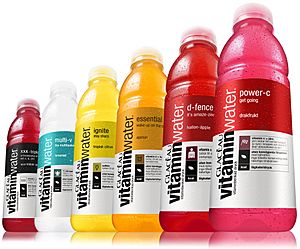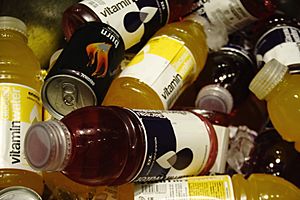Energy Brands facts for kids
| Subsidiary | |
| Industry | Beverage manufacturing and bottling |
| Fate | Acquired |
| Successor | The Coca-Cola Company |
| Founded | May 1996 |
| Founders | J. Darius Bikoff Mike Repole |
| Headquarters | , |
|
Number of locations
|
37 |
|
Key people
|
Mike Repole, President Mike Venuti, CFO Carol Dollard, COO Rohan Oza, CMO |
| Products | VitaminWater SmartWater VitaminWater10 VitaminWaterZero |
| Revenue | US$350 million (2006) |
|
Number of employees
|
750 |
| Parent | The Coca-Cola Company |
Energy Brands, also known as Glacéau, is a company that makes and sells special drinks called enhanced water. It's a part of The Coca-Cola Company. The company is based in Whitestone, Queens, New York.
Energy Brands was started in May 1996 by J. Darius Bikoff. Their first product was Smartwater, which has electrolytes added. At first, Energy Brands sold its drinks in health food stores and small shops in New York. Later, they added Fruitwater in 1998 and Vitaminwater in 2000. By the early 2000s, their drinks were sold all over the United States.
By 2002, Glacéau drinks were the most popular enhanced water brand in the U.S. Their best-selling drink was Vitaminwater. In 2006, the company made US$350 million. Energy Brands then started selling its products in other countries, like the United Kingdom and Australia in 2008, France in 2009, and Argentina in 2011.
Most of Energy Brands was owned by Bikoff, employees, and small investors. The rapper 50 Cent also owned a small part of the company because he helped promote their products. In 2007, The Coca-Cola Company bought Energy Brands.
Contents
The Story of Energy Brands
J. Darius Bikoff started Energy Brands in May 1996. He was very interested in health. He got the idea for vitamin-enhanced water when he felt a bit sick and thought about mixing Vitamin C with mineral water. He wondered why these couldn't be together in one drink.
Bikoff used his own money to start the company. He worked with a company in Connecticut to get the water. The first product was Glacéau Smartwater.
Starting the company was "very tough" for Bikoff because he had no experience making drinks. He also faced personal difficulties at the time. He began by selling Smartwater himself to small, independent natural food stores in New York. When it became popular, he sold it across the state. He used the same method for Fruitwater (1998) and Vitaminwater (2000).
By 2001, Energy Brands' drinks were sold in over 4,000 stores in the New York area. Bikoff said this helped his products grow without big drink companies noticing them too soon. Later, he worked with different distributors to sell his drinks all over the country.
A company called LVMH bought 30% of Energy Brands. LVMH later sold its shares to another investor. These shares eventually went to the Tata Group from India in August 2006. Tata Group paid $677 million for their part of the company.
Coca-Cola Buys Energy Brands
On May 25, 2007, The Coca-Cola Company bought Energy Brands for $4.1 billion in cash.
The Tata Group received $1.2 billion for their 30% ownership. Even after being bought, Energy Brands mostly runs on its own. Coca-Cola lets Bikoff and his team manage the company. Bikoff said, "We run independently, we have our own offices. If Coca-Cola don't call me, I don't call them."
After joining Coca-Cola, Energy Brands started selling its products in the United Kingdom and Australia in 2008. France followed in 2009, and Argentina in 2011. The company also plans to expand to Canada and Mexico.
Legal Challenges
On April 5, 2006, Energy Brands sued PepsiCo. They said that PepsiCo's "Life Water" packaging looked too much like their own drinks. PepsiCo later agreed to change its packaging.
On January 14, 2009, a group called the Center for Science in the Public Interest (CSPI) filed a lawsuit against Coca-Cola. They said that Vitaminwater was advertised as a "healthy choice" instead of soda, but this was misleading. The CSPI said that the 33 grams of sugar in each bottle of Vitaminwater could cause health problems like obesity and diabetes. Coca-Cola said these claims were "ridiculous" and that no one would think Vitaminwater was a completely healthy drink.
In 2011, a judge decided that different lawsuits against Coca-Cola about Vitaminwater's health claims could be combined into one big case.
How Energy Brands Works
Money Matters
Energy Brands was a private company, so it didn't have to share its sales numbers. Bikoff never said exactly how much of the company he owned before it was sold. In 2006, the company's yearly sales were reported to be $350 million.
Before Coca-Cola bought the company, 70% of the shares were owned by employees and small investors. The other 30% was owned by the Tata Group. In October 2004, the rapper Curtis Jackson, known as 50 Cent, was given a small part of the company. This was part of a deal for him to promote the drinks. He liked the drinks and helped create a new grape-flavored "Formula 50" Vitaminwater. He also talked about the drinks in his songs and interviews.
It's not known exactly how much money 50 Cent made when Coca-Cola bought the company, but it was a lot. Even though he no longer owns a part of the company, 50 Cent still promotes Vitaminwater.
What They Sell
Energy Brands' first product was Glacéau Smartwater, launched in 1996. It's water that's been vapor-distilled and has electrolytes added. Glaceau Fruitwater came out in 1998, adding zero-calorie fruit flavors to Smartwater.
In 2000, Vitaminwater was launched. It added vitamins and natural flavors to Smartwater. It was made for adults who wanted to drink more water but found plain water boring. Vitaminwater has fewer calories than soda and is meant to hydrate people and give them some nutrients.
In 2002, Glacéau drinks were the top-selling enhanced water brand. Vitaminwater is their most successful product. In 2009, Glacéau Vitaminwater launched Vitaminwater10, which has only 10 calories per serving. Later, they released Vitaminwater Zero, which has no calories. Both drinks use Truvia as a sweetener. Vitaminwater Zero also used Erythritol until March 2023, when it switched to stevia and monk fruit for some flavors.
vitaminwater
Vitaminwater is a drink from Energy Brands that came out in 2000. It's a mineral water product with added ingredients depending on the flavor and what the drink is supposed to do.
Misleading Ads for Vitaminwater
In 2008, an Australian consumer group called Choice gave Vitaminwater a "Shonky" award. They said that even though the drinks claimed to be healthy, one bottle had about a third of the sugar an adult woman should have in a day. They also noted that none of the drinks had more than 1% fruit juice. Choice also pointed out that one label seemed to make fun of food rules by saying, "We are prohibited from making exaggerated claims about the potency of the nutrients in this bottle," right before making exaggerated claims.
In 2009, the Center for Science in the Public Interest (CSPI) sued Coca-Cola, the owner of Vitaminwater. The lawsuit said that advertising the drink as a "healthy choice" instead of soda was misleading. The CSPI said that the 33 grams of sugar in each bottle of Vitaminwater could cause health problems like obesity and diabetes. Coca-Cola said the lawsuit was "ridiculous" and that no one would think Vitaminwater was a completely healthy drink. In 2013, a judge ruled that the lawsuit could continue as a group lawsuit.
In January 2011, the Advertising Standards Authority (ASA) in the UK said that an ad calling Vitaminwater "nutritious" was misleading. This was because of the high sugar content (23 grams per 500 ml bottle). The ASA banned the ad, saying that because Vitaminwater had about a quarter of a person's daily sugar limit, calling it "nutritious" was misleading.
Vitaminwater Flavors
| Label | Flavor | Vitamins and other additives | |
|---|---|---|---|
| Breeze-E | strawberry watermelon | C, B5, B6, B12 | |
| Revive | fruit punch | B, C, potassium | |
| Power-C | dragonfruit | C, taurine | |
| Energy | tropical citrus | B, guarana, C, electrolytes, caffeine | |
| Focus | kiwi-strawberry | C, B5, B6, B12 | |
| Squeezed | lemonade | B, C, E, zinc, calcium | |
| XXX | acai-blueberry pomegranate | vitamin B, C, triple antioxidants | |
| Essential | orange-orange | C, calcium | |
| "Vital-T | lemon tea | C + E | |
| Refresh | tropical mango | E, B5, B6, B12, electrolytes, C | |
| Go-Go (Zero) | mixed berry | E, ribose | |
| Rise (Zero) | orange | B3, B5, B6, B12, C, electrolytes | |
| Squeezed (Zero) | lemonade | "8 key nutrients from a – zinc" | |
| XXX (Zero) | acai-blueberry pomegranate | antioxidants | |
| Shine (Zero) | strawberry lemonade | B5, B6, B12, C, electrolytes | |
| Reset (Zero) | pineapple coconut | B5, B6, B12, C, electrolytes, potassium | |
| Focus (Zero) | kiwi-strawberry | C, B5, B6, B12 | |
| Revive (Zero) | fruit punch | B, C, potassium | |
| Power-C (Zero) | dragonfruit | C, B5, B6, B12, zinc, chromium, taurine | |
| Ice (Zero) | cool blueberry lavender | C, B3, B5, B6, B12, iron, chamomile, l-theanine | |
| Gutsy (Zero) | watermelon peach | B3, B5, B6, B12, | |
- 1st generation: Revive, Power-C, Energy, Focus, Essential
- 2nd generation: Defense, Formula 50, B-Relaxed, XXX, Multi-V
- 3rd generation: Balance, Endurance, Vital-T, Rescue, Charge
- 4th generation: Dwnld, Tranquilo, Connect, Spark, Stur-D
Vitaminwater Flavors No Longer Sold
- Power-C – acerola (first to be discontinued)
- Perform – lemon-lime
- Defense – raspberry-apple
- Stress-B – lemon-lime
- Endurance – peach-mango
- B-Relaxed – jackfruit-guava
- Tranquilo – tamarind-pineapple
- Formula 50 – grape
- Drive – blood-orange mixed-berry
- Spark - grape-blueberry
- Glow - strawberry-guanabana
- Rescue - green tea
- Stur-D - blue agave-Passionfruit-Citrus
- Fire - spicy watermelon
Smartwater
Smartwater is water that has been vapor-distilled, and then electrolytes are added to improve the taste. It was first introduced in 1996 as Ice Mountain Spring Water. In 1998, its name was changed to Smartwater. You can find it in different bottle sizes, like 600 mL, 1 L, and 1.5 L.
Famous people have promoted Smartwater. Jennifer Aniston was the spokesperson from 2007 to 2020. Then Gal Gadot took over. In June 2022, Zendaya became the new ambassador for the brand.
vitaminenergy
vitaminenergy is an energy drink made by Energy Brands. It has many of the same ingredients as vitaminwater, such as sugar, electrolytes, natural flavors, and vitamins (like B3, B5, B6, B12, and C). It also contains natural caffeine and ribose. The specific ingredients change based on the drink's flavor. It comes in cans (16 oz, 200 calories, 150 mg caffeine) or as small 2 oz "shots" with no calories.
vitaminenergy Flavors
- Dragonfruit
- Tropical Citrus
- Fruit Punch
fruitwater
fruitwater was a sparkling drink that was less sweet than Vitaminwater. It was sold from 2013 to 2015. It had similar ingredients but with a light fruit flavor and less sugar. Even though it's called "fruitwater," it didn't contain real fruit juice, only "natural flavor." It also contained Guarana seed, which has a lot of caffeine. Coca-Cola stopped selling fruitwater in 2015 because it didn't sell very well.
fruitwater Flavors
- Black Raspberry
- Strawberry Kiwi
- Lemon-Lime
- Orange Mango
- Watermelon Punch
 | Kyle Baker |
 | Joseph Yoakum |
 | Laura Wheeler Waring |
 | Henry Ossawa Tanner |



